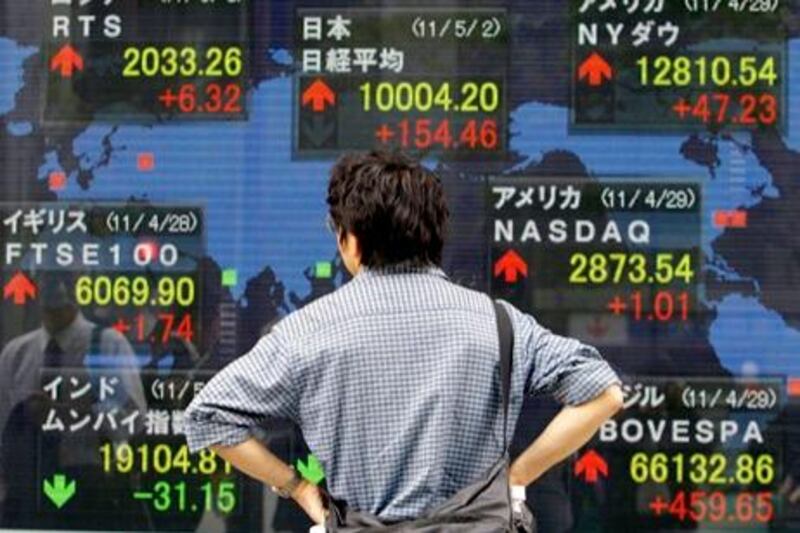Global stock markets rallied, the dollar rebounded from a nine-day decline and the prices of oil and gold sank as investors around the world learned of Osama bin Laden's death.
Osama bin Laden: Complete coverage of the killing of the world's most wanted terrorist.
Last Updated: May 3, 2010
Leaders praise US for bin Laden raid; India criticised Pakistan
Leaders around the world praise the US for raiding Osama bin Laden's mansion in Pakistan and killing him.
[ Read article ]
Osama bin Laden (1957-2011)
To his enemies he was the epitome of evil, but to his supporters he was a hero.
[ Read article ]
Afghans worry that US will withdraw now that Osama is dead
"We came here for bin Laden but we're staying for the Afghans," a US military analyst says after US special forces kill the al Qa'eda leader.
[ Read article ]
US celebrates Osama bin Laden death at White House
Thousands converge on the White House to celebrate the death of Osama bin Laden.
[ Read article ]
Now to undo the damage bin Laden did
Bin Laden declared war on the United States, but the battlefield has been the Middle East and South Asia.
[ Read article ]
In Japan, the Nikkei 225 index gained 1.6 per cent to close at its highest level since the devastating earthquake and tsunami in March. US stock futures indicated a strong opening performance in New York, with markets in France and Germany also gaining ground.
Some regional markets also reacted positively to the terrorist leader's death, with Egypt's benchmark stock index surging the most in almost two weeks. Kuwait, Oman and Saudi Arabia markets all closed up, although the UAE, Dubai and Abu Dhabi markets remained flat.
Oil prices had surged in recent weeks as concerns about supply constraints escalated after violence in Libya and troubles elsewhere in the region. But oil futures fell 2.2 per cent to US$111.46 a barrel on the New York Mercantile Exchange as news of bin Laden's death was revealed yesterday. Later in the day, however, the price of oil began to climb again.
A lower dollar has helped to underpin oil's recent strength, as low US interest rates compared with tighter monetary policy elsewhere have held the greenback down. Weakness in the dollar tends to push up oil prices as the cost of crude drops for other international currency holders.
Yesterday the dollar index, which tracks its performance against a basket of major currencies, rose from a three-year low of 72.813, to 73.227 as news of bin Laden's death emerged. Later in the trading session it fell back for the 10th day.
"A stronger US dollar can cause a pull-back in commodity prices, and help support consolidation in local markets that we have been seeing recently," said Haissam Arabi, the chief executive of Gulfmena Alternative Investments in Dubai.
Further signs of an improving risk perception emerged in other commodity markets.
Gold prices initially dropped $1.60 to $1,554.80 an ounce after earlier reaching a record high. Demand for the commodity has soared in recent weeks as dollar weakness has encouraged investors to seek out alternative safe havens.
Silver also fell, by as much as 10 per cent, as the stronger dollar combined with a market oversupply to drag the precious metal lower.
But the precious metals began to climb again later in the session.
Yields of US treasuries rose as declines hit other bonds, usually favoured as havens from risk.
But even as investors returned to markets, some analysts warned the euphoria would be short-lived.
"There's been jubilation but the reality will kick in a few days," said John Sfakianakis the chief economist at Banque Saudi Fransi. "In the short term, the dollar will get a bit stronger and equity markets will rally as riskier assets look more opportune."
Concerns stemming from debt troubles in the US and euro zone, along with uncertainty in the Middle East and North Africa caused by unrest, would return to stalk markets.
"After an initial euphoria on the markets I don't expect to see much correlation with his death and the debt profile of the region," said Ahmad Alanani, the director of fixed income sales and trading, Middle East and North Africa, at Exotix in Dubai. "It's such a remote incident that I don't think it will be priced in."
In the short term, however, bin Laden's death appeared to remove some of the negativity caused by recent regional turmoil.
"It's clear that we've been paying a risk premium because of security and political-related events," said Dr Nasser Saidi, the chief economist and head of external relations of the Dubai International Financial Centre Authority. "That's built into oil prices and the higher return that investors are looking to in the region."
[ fhalime@thenational.ae ]
[ ghunter@thenational.ae ]
[ halsayegh@thenational.ae ]






